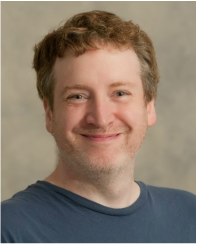
I knew I wanted to be a director when I was 13. I founded a high school video club to scratch that itch in the 80s (MTV-inspired!). I directed my first play at 19; Agatha Christie's Ten Little Indians on an Air Force base in the Philippines—I was the youngest member of the entire production. I've never been to school for theater; I've learned from doing and observing. As such, I don't have a dialed-in industry vocabulary which can sometimes be challenging—my ideas of a "beat" or diagramming a script are probably not the formal definitions. I work intuitively and collaboratively. I don't know if that's the most efficient methodology, but it sure is fun and while actors may occasionally wrinkle their brows figuring me out, we seem to happily arrive at theater together.
At its core, A Number is about:
Nature. Shaped by nurture. But mostly identity, the fragile glaze that binds them. If nature is the basic clay of identity, and nurture the long slow shaping, why does simply learning where the clay came from suddenly cause a crack to appear? Does nurture get re-written: is the shaping redone? Is nature altered: does the clay fundamentally change? Science tells us that yes, trauma can actually change DNA. Epigenetics is a thing. But we're looking more at how individual identities are bound to others, and how the reflection of one's identity in another, especially parent to child and vice versa, can be utterly foundational.
What is the most challenging aspect of directing A Number?
I think the inspiring challenges are more in the “Bake Off” format than the script! So few rehearsals! In the script, mapping truths and lies has been an interesting puzzle.
Are you approaching your section of A Number as mutually exclusive from the other two pieces?
We read the whole script a time or two. I think we all believe that more information is better when trying to understand the story, character's histories and motivations, and what's a lie versus what's not. But we've made no efforts to map anything that might be useful beyond our section. For example, we haven't given any thought to a nature aspect of the Michael character since he doesn't appear in our section, like do all three clones echo a physical affectation we can see and how would it present specifically in Michael and how would it affect Salter? Don't care! Is the set layout going to work for later scenes, and how should later needs inform earlier scenes (normal things you discover in rehearsal). Don't care! If we had the whole show, we'd pay attention to those things, but “ain't nobody got time for that!”
The script for A Number does not have many stage directions, or even much punctuation; do you consider this a gift or a challenge when directing your “slice” of The Bake Off?
Both. The dialogue is powerfully real this way, and there's freedom to live and move in it. It's like how we really think-talk, but not how we normally perform. It is a challenge to memorize, however. Chris and Bruce have worked really hard on it! Stage directions might have made blocking slightly more efficient in our compressed process, but having none written means we can make bold choices and own them, which is perfect for The Bake Off!
What makes directing this play fun?
What powerfully moves me and makes it totally rewarding is getting to work with super talented actors like Bruce and Chris. I am lucky, humbled, and blessed to be their audience of one! One fun thing about this script for me is that it gets the science right (it bugs me when scripts get science wrong), yet the science is merely a layer under the story of relationships and identities. The science—and even the ethics of the science—do not try to own the story. It's merely what happened (what could happen? what will happen?), and while it informs the story it isn't the whole story. Some of the characters’ feelings could map onto near-parallel stories like, "I had a twin I never knew about that you drowned at childbirth" or "I just found out I was adopted from the prison orphanage, one of sextuplets" or "my dad had a secret second family." The cloning gives a wonderful new twist to explore, though, (what constitutes my uniqueness?) without just being a story about test tubes. One last fun thing was discovering all kinds of music about clones—I am now a Gary Numan fan.
What's your favorite line in the play?
So many!!!!! I'll force myself to pick one … Bernard says, “you called them things. I think we'll find they're people.”



